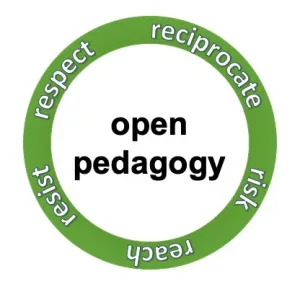1.5 Open Educational Practices (OEP)

Open Educational Practices (OEP) are teaching methods that live under the umbrella of open pedagogy, a course design approach that prioritizes student agency when creating knowledge.
Open pedagogy projects are student-created and often shared with an open license so that future students, instructors, and communities can reuse, revise or remix them. Open Educational Practices are the approaches, supports, and processes that instructors use to scaffold tasks and choices so that students may design an open pedagogy project by and as themselves.
Open Educational Practices (OEP) are transformative because they invite students into a different relationship with instructors and with knowledge. With open pedagogy, students can be collaborators and creators rather than only learners and consumers. Students can create renewable assignments rather than disposable assignments, or assignments that have no application outside the limited duration of a course.
To create opportunities for students to create their own renewable assignments, you can follow this step-by-step guide from Designing a Renewable Assignment, Part 1 from the OER Starter Kit.
The Open Pedagogy Project Roadmap is also a great workbook to help you plan an open pedagogy project.
Scoping your Open Pedagogy Project
To reflect on how you might begin an open pedagogy project with your students, consider the following questions:
- What could the project include? What will students be doing?
- When will this project be completed? Is it one-time over one term or long-term over multiple years and multiple course cohorts, or modular?
- What content do you want/need to cover?
- Open pedagogy is inherently more process-centric than more conventional teaching methods, but there is undoubtedly considerable content that you need to cover. It can be helpful to map your content to your process to ensure that the content doesn’t get lost.
- What is the process for this work going to look like in the classroom?
- Think about what the intended final output(s) of this project and work backward from this goal in order to determine what assignments are necessary. For instance, if you want to produce an OER textbook, you may need to create multiple assignments over a period of several semesters in order to generate different components of that textbook.
- Where will students do it?
- In the learning management system
- In Pressbooks or another digital book publishing system
- In shared Google or Microsoft products
- On the public web
- In WikiEdu
- In hypothes.is
Student consent
Students may have a variety of legitimate reasons for not wanting to share their work openly.
- In what way(s) will you allow them to exercise their agency? Students should have options. This may be an opt-in or opt-out process or may allow students to share their work under a pseudonym.
- How will you obtain and document student consent? Be sure to do this in a way that eliminates any potential to impact grades if students choose to opt out.
- What role will students have in choosing the license for work they are contributing to? How will you educate them about licensing?
What are some great examples of open pedagogy projects?
There are fabulous collections of open pedagogy projects to explore.
- Open Pedagogy projects compiled by Austin Community College Library Services: include examples of students as textbook contributors, students as question bank authors, students as community partners, and students as content producers.
- Open Pedagogy Approaches: explores open pedagogy projects from a number of academic disciplines
- Open Pedagogy Notebook: includes examples and invitations to contribute your own work!
- Open Pedagogy Assignments: covers ways that students might edit existing works, revise and remix existing works, build ancillaries (things like test banks, presentation tools, practice problem sets, and illustrations), and creating fresh works
Reflection Questions
- What is the most intimidating aspect of starting an open pedagogy project in your course?
- How does your institution currently support student consent to share their work with an open license? Does your institution maintain a repository, for example?
- Review the open pedagogy project examples. Which projects resonate the most with you and your goals for your students?
Licenses and Attributions
“Open Educational Practices (OEP)” by Veronica Vold for Open Oregon Educational Resources is licensed CC BY and is adapted from the following sources:
- “Designing a Renewable Assignment Worksheet” by Stacy Katz and Abbey Elder licensed CC BY
- “The Open Pedagogy Project Roadmap” by Christina Riehman-Murphy and Bryan McGeary licensed CC BY-NC
- Open Pedagogy in A Guide to Making Open Textbooks with Students by the Rebus Community licensed CC BY
- Image source: “5 Rs of open pedagogy” by Rajiv Jhangiani is licensed CC BY-SA 4.0

